Reflective Journal: Comprehensive Business Research Analysis
VerifiedAdded on 2021/05/27
|9
|2049
|312
Journal and Reflective Writing
AI Summary
This reflective journal provides a comprehensive overview of a business research unit, covering various aspects of the research process. The journal begins with an introduction outlining the purpose of the journal, which is to track notes, questions, and analyses of the course content. Each week's learning is detailed, starting with the nature, process, and strategy of business research, including discussions on research design, literature review, ethics, and legal considerations. The journal then delves into qualitative and quantitative research methods, including sampling, interviewing, data analysis, and questionnaire design. The student reflects on the practical applications of each concept and how it will aid in their future career. The journal concludes with an analysis of mixed methods research and a summary of the key takeaways from the unit, referencing various academic sources. The student emphasizes the importance of the course content in their development as a future accountant and reflects on the practical application of the concepts learned throughout the course.
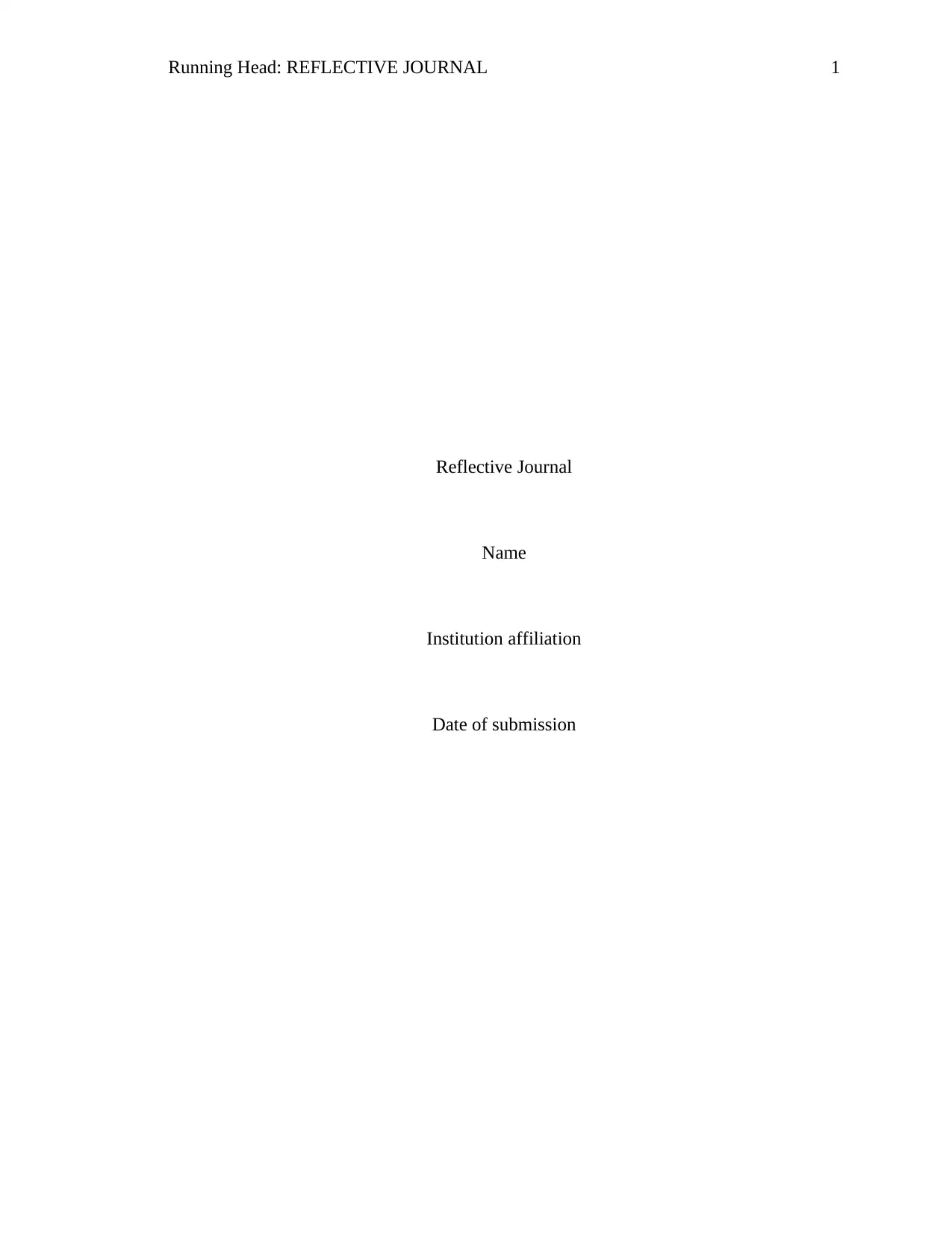
Running Head: REFLECTIVE JOURNAL 1
Reflective Journal
Name
Institution affiliation
Date of submission
Reflective Journal
Name
Institution affiliation
Date of submission
Paraphrase This Document
Need a fresh take? Get an instant paraphrase of this document with our AI Paraphraser
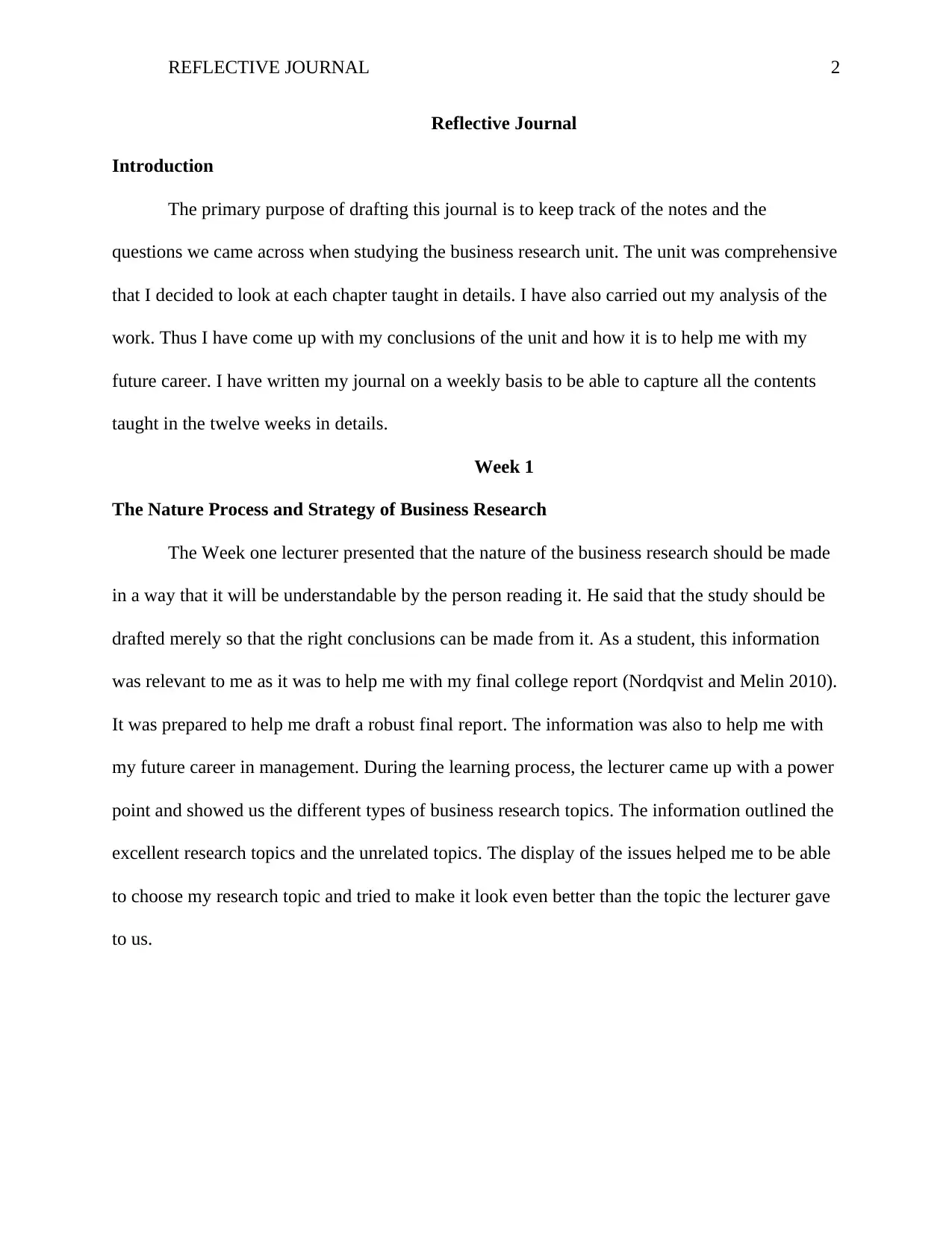
REFLECTIVE JOURNAL 2
Reflective Journal
Introduction
The primary purpose of drafting this journal is to keep track of the notes and the
questions we came across when studying the business research unit. The unit was comprehensive
that I decided to look at each chapter taught in details. I have also carried out my analysis of the
work. Thus I have come up with my conclusions of the unit and how it is to help me with my
future career. I have written my journal on a weekly basis to be able to capture all the contents
taught in the twelve weeks in details.
Week 1
The Nature Process and Strategy of Business Research
The Week one lecturer presented that the nature of the business research should be made
in a way that it will be understandable by the person reading it. He said that the study should be
drafted merely so that the right conclusions can be made from it. As a student, this information
was relevant to me as it was to help me with my final college report (Nordqvist and Melin 2010).
It was prepared to help me draft a robust final report. The information was also to help me with
my future career in management. During the learning process, the lecturer came up with a power
point and showed us the different types of business research topics. The information outlined the
excellent research topics and the unrelated topics. The display of the issues helped me to be able
to choose my research topic and tried to make it look even better than the topic the lecturer gave
to us.
Reflective Journal
Introduction
The primary purpose of drafting this journal is to keep track of the notes and the
questions we came across when studying the business research unit. The unit was comprehensive
that I decided to look at each chapter taught in details. I have also carried out my analysis of the
work. Thus I have come up with my conclusions of the unit and how it is to help me with my
future career. I have written my journal on a weekly basis to be able to capture all the contents
taught in the twelve weeks in details.
Week 1
The Nature Process and Strategy of Business Research
The Week one lecturer presented that the nature of the business research should be made
in a way that it will be understandable by the person reading it. He said that the study should be
drafted merely so that the right conclusions can be made from it. As a student, this information
was relevant to me as it was to help me with my final college report (Nordqvist and Melin 2010).
It was prepared to help me draft a robust final report. The information was also to help me with
my future career in management. During the learning process, the lecturer came up with a power
point and showed us the different types of business research topics. The information outlined the
excellent research topics and the unrelated topics. The display of the issues helped me to be able
to choose my research topic and tried to make it look even better than the topic the lecturer gave
to us.
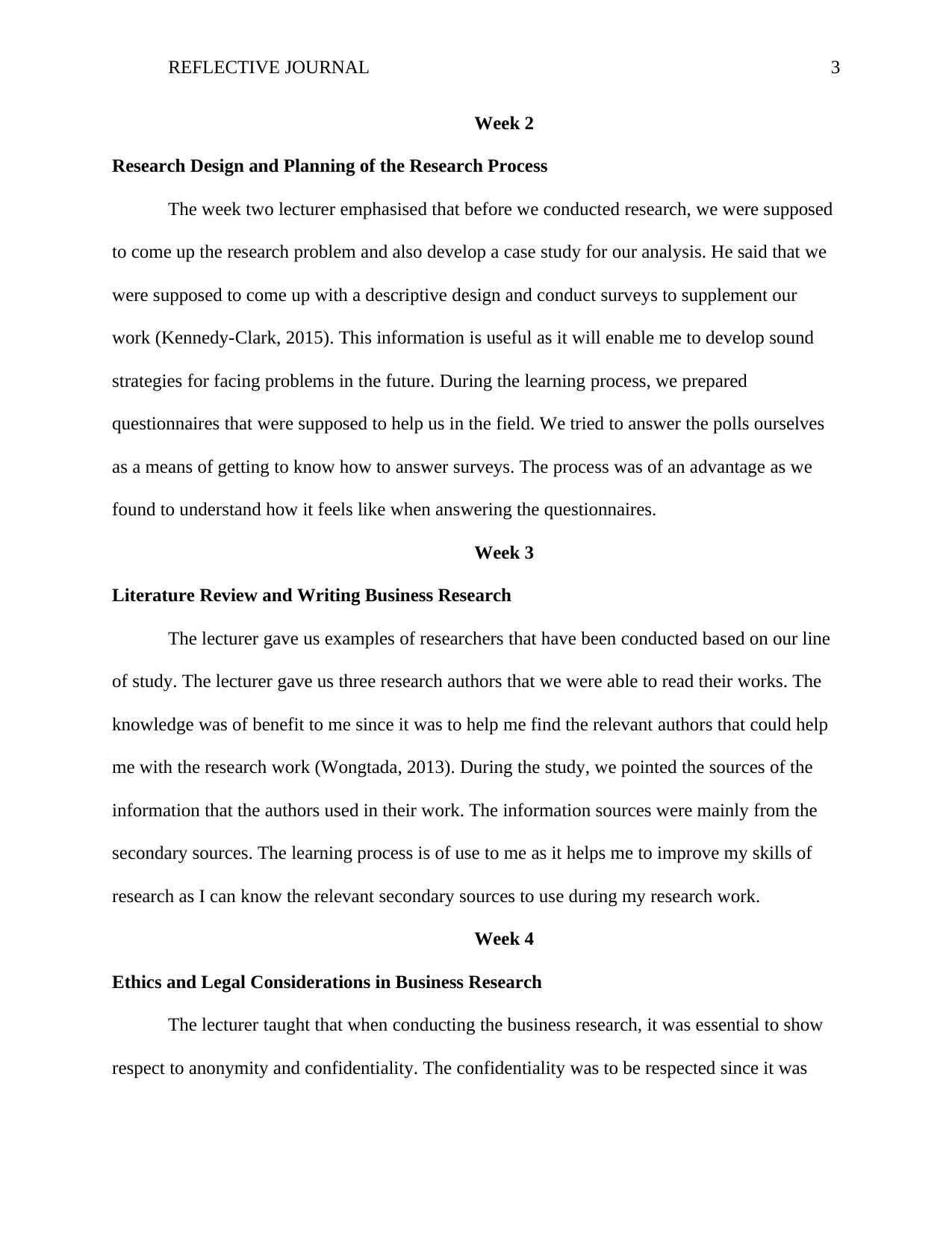
REFLECTIVE JOURNAL 3
Week 2
Research Design and Planning of the Research Process
The week two lecturer emphasised that before we conducted research, we were supposed
to come up the research problem and also develop a case study for our analysis. He said that we
were supposed to come up with a descriptive design and conduct surveys to supplement our
work (Kennedy-Clark, 2015). This information is useful as it will enable me to develop sound
strategies for facing problems in the future. During the learning process, we prepared
questionnaires that were supposed to help us in the field. We tried to answer the polls ourselves
as a means of getting to know how to answer surveys. The process was of an advantage as we
found to understand how it feels like when answering the questionnaires.
Week 3
Literature Review and Writing Business Research
The lecturer gave us examples of researchers that have been conducted based on our line
of study. The lecturer gave us three research authors that we were able to read their works. The
knowledge was of benefit to me since it was to help me find the relevant authors that could help
me with the research work (Wongtada, 2013). During the study, we pointed the sources of the
information that the authors used in their work. The information sources were mainly from the
secondary sources. The learning process is of use to me as it helps me to improve my skills of
research as I can know the relevant secondary sources to use during my research work.
Week 4
Ethics and Legal Considerations in Business Research
The lecturer taught that when conducting the business research, it was essential to show
respect to anonymity and confidentiality. The confidentiality was to be respected since it was
Week 2
Research Design and Planning of the Research Process
The week two lecturer emphasised that before we conducted research, we were supposed
to come up the research problem and also develop a case study for our analysis. He said that we
were supposed to come up with a descriptive design and conduct surveys to supplement our
work (Kennedy-Clark, 2015). This information is useful as it will enable me to develop sound
strategies for facing problems in the future. During the learning process, we prepared
questionnaires that were supposed to help us in the field. We tried to answer the polls ourselves
as a means of getting to know how to answer surveys. The process was of an advantage as we
found to understand how it feels like when answering the questionnaires.
Week 3
Literature Review and Writing Business Research
The lecturer gave us examples of researchers that have been conducted based on our line
of study. The lecturer gave us three research authors that we were able to read their works. The
knowledge was of benefit to me since it was to help me find the relevant authors that could help
me with the research work (Wongtada, 2013). During the study, we pointed the sources of the
information that the authors used in their work. The information sources were mainly from the
secondary sources. The learning process is of use to me as it helps me to improve my skills of
research as I can know the relevant secondary sources to use during my research work.
Week 4
Ethics and Legal Considerations in Business Research
The lecturer taught that when conducting the business research, it was essential to show
respect to anonymity and confidentiality. The confidentiality was to be respected since it was
⊘ This is a preview!⊘
Do you want full access?
Subscribe today to unlock all pages.

Trusted by 1+ million students worldwide
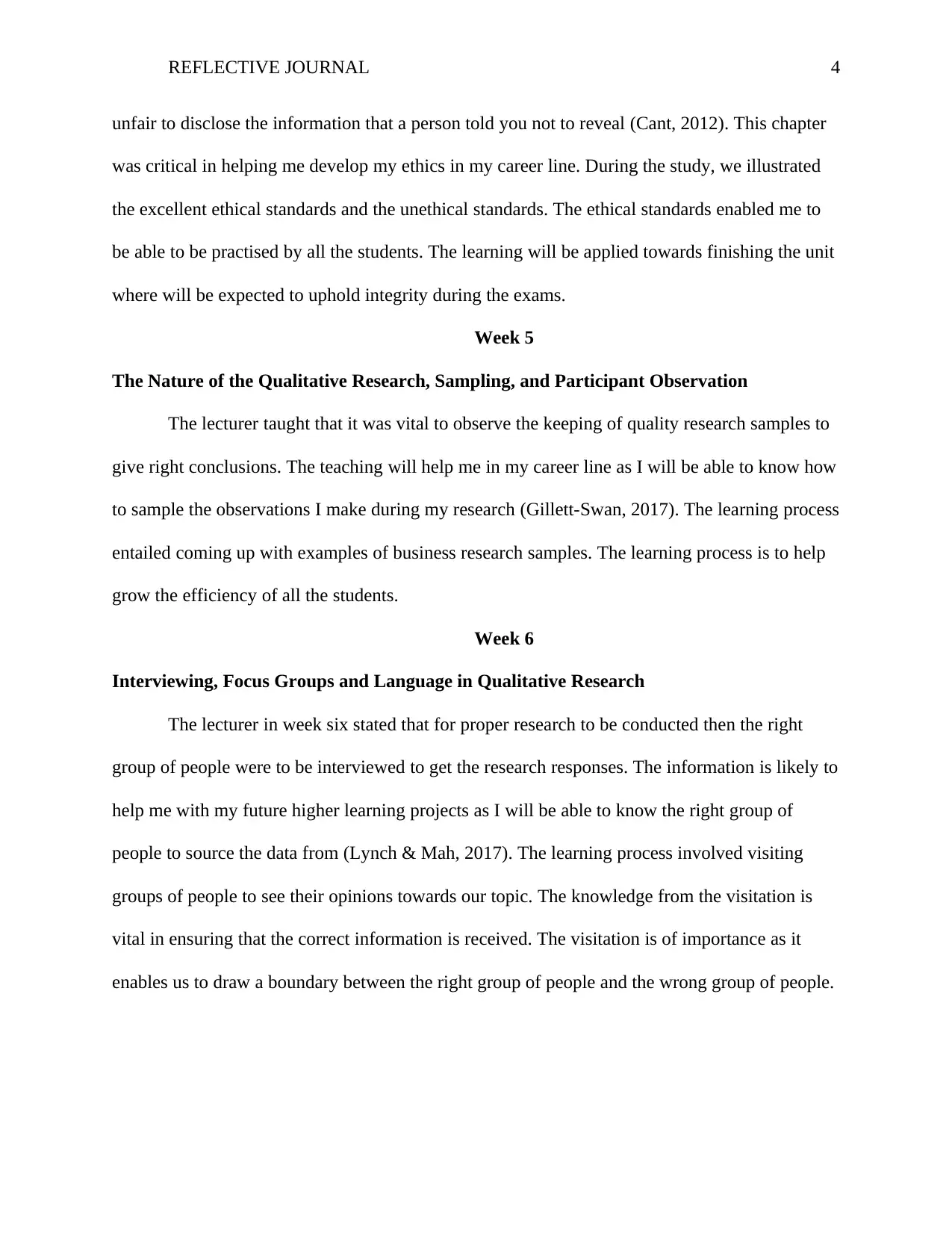
REFLECTIVE JOURNAL 4
unfair to disclose the information that a person told you not to reveal (Cant, 2012). This chapter
was critical in helping me develop my ethics in my career line. During the study, we illustrated
the excellent ethical standards and the unethical standards. The ethical standards enabled me to
be able to be practised by all the students. The learning will be applied towards finishing the unit
where will be expected to uphold integrity during the exams.
Week 5
The Nature of the Qualitative Research, Sampling, and Participant Observation
The lecturer taught that it was vital to observe the keeping of quality research samples to
give right conclusions. The teaching will help me in my career line as I will be able to know how
to sample the observations I make during my research (Gillett-Swan, 2017). The learning process
entailed coming up with examples of business research samples. The learning process is to help
grow the efficiency of all the students.
Week 6
Interviewing, Focus Groups and Language in Qualitative Research
The lecturer in week six stated that for proper research to be conducted then the right
group of people were to be interviewed to get the research responses. The information is likely to
help me with my future higher learning projects as I will be able to know the right group of
people to source the data from (Lynch & Mah, 2017). The learning process involved visiting
groups of people to see their opinions towards our topic. The knowledge from the visitation is
vital in ensuring that the correct information is received. The visitation is of importance as it
enables us to draw a boundary between the right group of people and the wrong group of people.
unfair to disclose the information that a person told you not to reveal (Cant, 2012). This chapter
was critical in helping me develop my ethics in my career line. During the study, we illustrated
the excellent ethical standards and the unethical standards. The ethical standards enabled me to
be able to be practised by all the students. The learning will be applied towards finishing the unit
where will be expected to uphold integrity during the exams.
Week 5
The Nature of the Qualitative Research, Sampling, and Participant Observation
The lecturer taught that it was vital to observe the keeping of quality research samples to
give right conclusions. The teaching will help me in my career line as I will be able to know how
to sample the observations I make during my research (Gillett-Swan, 2017). The learning process
entailed coming up with examples of business research samples. The learning process is to help
grow the efficiency of all the students.
Week 6
Interviewing, Focus Groups and Language in Qualitative Research
The lecturer in week six stated that for proper research to be conducted then the right
group of people were to be interviewed to get the research responses. The information is likely to
help me with my future higher learning projects as I will be able to know the right group of
people to source the data from (Lynch & Mah, 2017). The learning process involved visiting
groups of people to see their opinions towards our topic. The knowledge from the visitation is
vital in ensuring that the correct information is received. The visitation is of importance as it
enables us to draw a boundary between the right group of people and the wrong group of people.
Paraphrase This Document
Need a fresh take? Get an instant paraphrase of this document with our AI Paraphraser
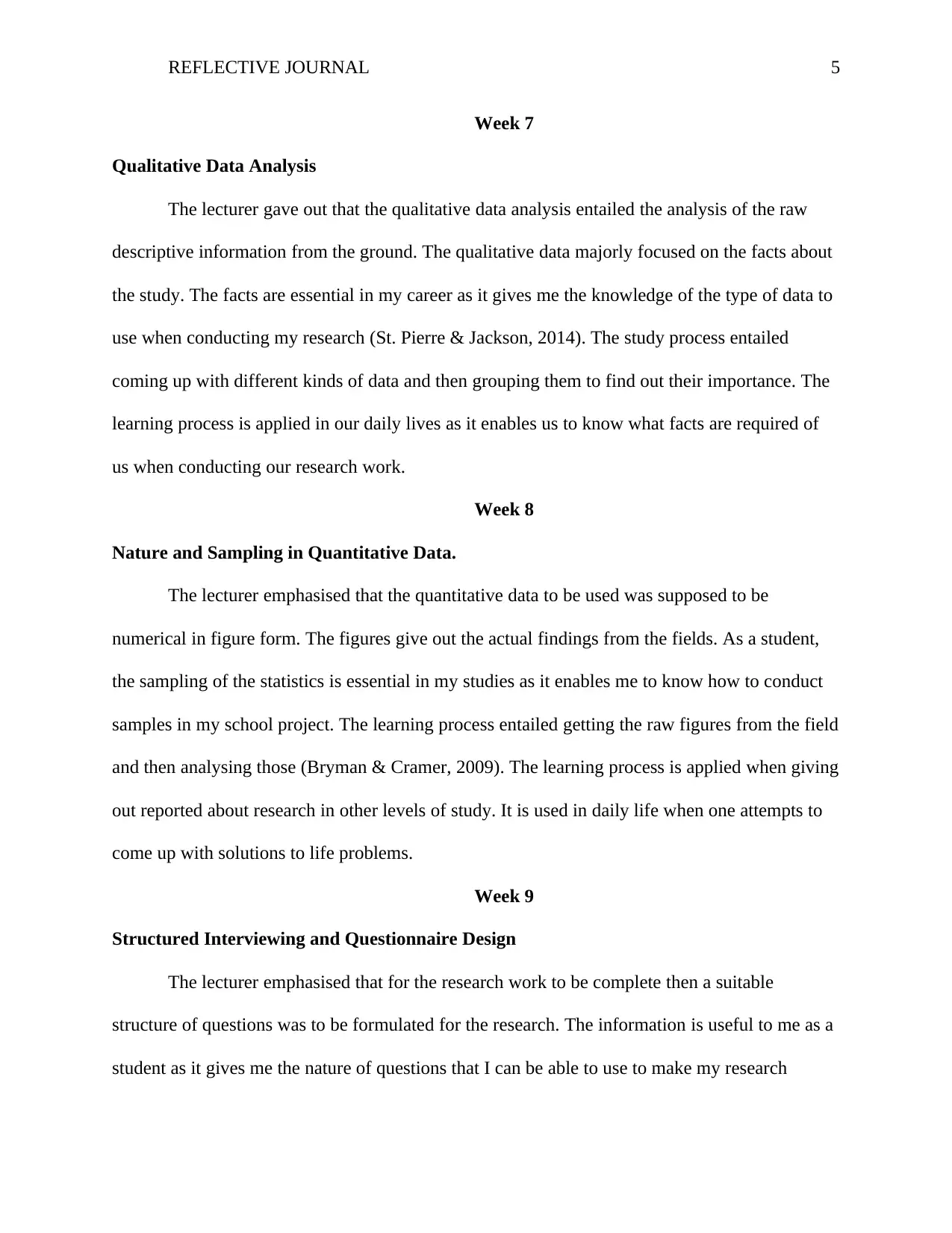
REFLECTIVE JOURNAL 5
Week 7
Qualitative Data Analysis
The lecturer gave out that the qualitative data analysis entailed the analysis of the raw
descriptive information from the ground. The qualitative data majorly focused on the facts about
the study. The facts are essential in my career as it gives me the knowledge of the type of data to
use when conducting my research (St. Pierre & Jackson, 2014). The study process entailed
coming up with different kinds of data and then grouping them to find out their importance. The
learning process is applied in our daily lives as it enables us to know what facts are required of
us when conducting our research work.
Week 8
Nature and Sampling in Quantitative Data.
The lecturer emphasised that the quantitative data to be used was supposed to be
numerical in figure form. The figures give out the actual findings from the fields. As a student,
the sampling of the statistics is essential in my studies as it enables me to know how to conduct
samples in my school project. The learning process entailed getting the raw figures from the field
and then analysing those (Bryman & Cramer, 2009). The learning process is applied when giving
out reported about research in other levels of study. It is used in daily life when one attempts to
come up with solutions to life problems.
Week 9
Structured Interviewing and Questionnaire Design
The lecturer emphasised that for the research work to be complete then a suitable
structure of questions was to be formulated for the research. The information is useful to me as a
student as it gives me the nature of questions that I can be able to use to make my research
Week 7
Qualitative Data Analysis
The lecturer gave out that the qualitative data analysis entailed the analysis of the raw
descriptive information from the ground. The qualitative data majorly focused on the facts about
the study. The facts are essential in my career as it gives me the knowledge of the type of data to
use when conducting my research (St. Pierre & Jackson, 2014). The study process entailed
coming up with different kinds of data and then grouping them to find out their importance. The
learning process is applied in our daily lives as it enables us to know what facts are required of
us when conducting our research work.
Week 8
Nature and Sampling in Quantitative Data.
The lecturer emphasised that the quantitative data to be used was supposed to be
numerical in figure form. The figures give out the actual findings from the fields. As a student,
the sampling of the statistics is essential in my studies as it enables me to know how to conduct
samples in my school project. The learning process entailed getting the raw figures from the field
and then analysing those (Bryman & Cramer, 2009). The learning process is applied when giving
out reported about research in other levels of study. It is used in daily life when one attempts to
come up with solutions to life problems.
Week 9
Structured Interviewing and Questionnaire Design
The lecturer emphasised that for the research work to be complete then a suitable
structure of questions was to be formulated for the research. The information is useful to me as a
student as it gives me the nature of questions that I can be able to use to make my research
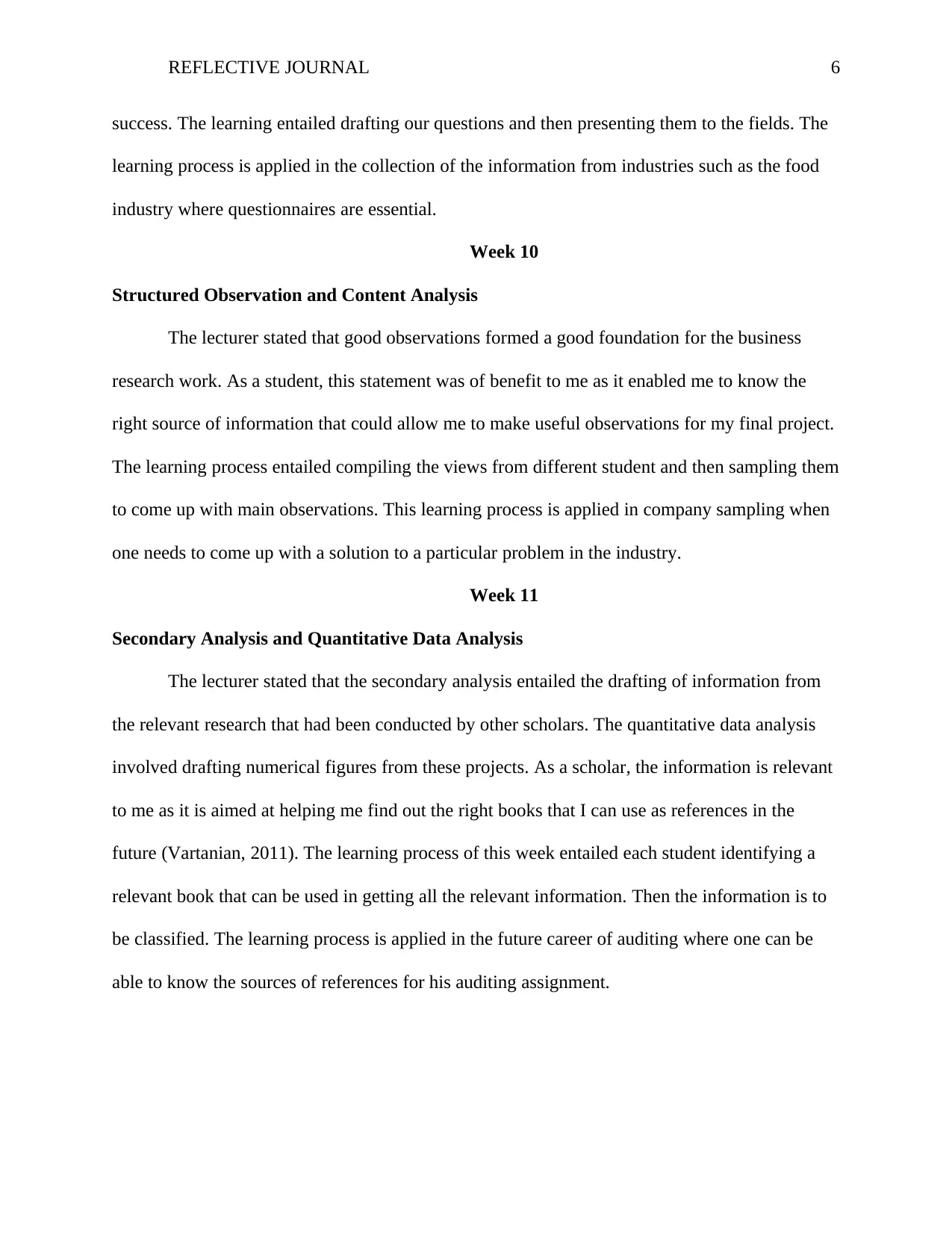
REFLECTIVE JOURNAL 6
success. The learning entailed drafting our questions and then presenting them to the fields. The
learning process is applied in the collection of the information from industries such as the food
industry where questionnaires are essential.
Week 10
Structured Observation and Content Analysis
The lecturer stated that good observations formed a good foundation for the business
research work. As a student, this statement was of benefit to me as it enabled me to know the
right source of information that could allow me to make useful observations for my final project.
The learning process entailed compiling the views from different student and then sampling them
to come up with main observations. This learning process is applied in company sampling when
one needs to come up with a solution to a particular problem in the industry.
Week 11
Secondary Analysis and Quantitative Data Analysis
The lecturer stated that the secondary analysis entailed the drafting of information from
the relevant research that had been conducted by other scholars. The quantitative data analysis
involved drafting numerical figures from these projects. As a scholar, the information is relevant
to me as it is aimed at helping me find out the right books that I can use as references in the
future (Vartanian, 2011). The learning process of this week entailed each student identifying a
relevant book that can be used in getting all the relevant information. Then the information is to
be classified. The learning process is applied in the future career of auditing where one can be
able to know the sources of references for his auditing assignment.
success. The learning entailed drafting our questions and then presenting them to the fields. The
learning process is applied in the collection of the information from industries such as the food
industry where questionnaires are essential.
Week 10
Structured Observation and Content Analysis
The lecturer stated that good observations formed a good foundation for the business
research work. As a student, this statement was of benefit to me as it enabled me to know the
right source of information that could allow me to make useful observations for my final project.
The learning process entailed compiling the views from different student and then sampling them
to come up with main observations. This learning process is applied in company sampling when
one needs to come up with a solution to a particular problem in the industry.
Week 11
Secondary Analysis and Quantitative Data Analysis
The lecturer stated that the secondary analysis entailed the drafting of information from
the relevant research that had been conducted by other scholars. The quantitative data analysis
involved drafting numerical figures from these projects. As a scholar, the information is relevant
to me as it is aimed at helping me find out the right books that I can use as references in the
future (Vartanian, 2011). The learning process of this week entailed each student identifying a
relevant book that can be used in getting all the relevant information. Then the information is to
be classified. The learning process is applied in the future career of auditing where one can be
able to know the sources of references for his auditing assignment.
⊘ This is a preview!⊘
Do you want full access?
Subscribe today to unlock all pages.

Trusted by 1+ million students worldwide
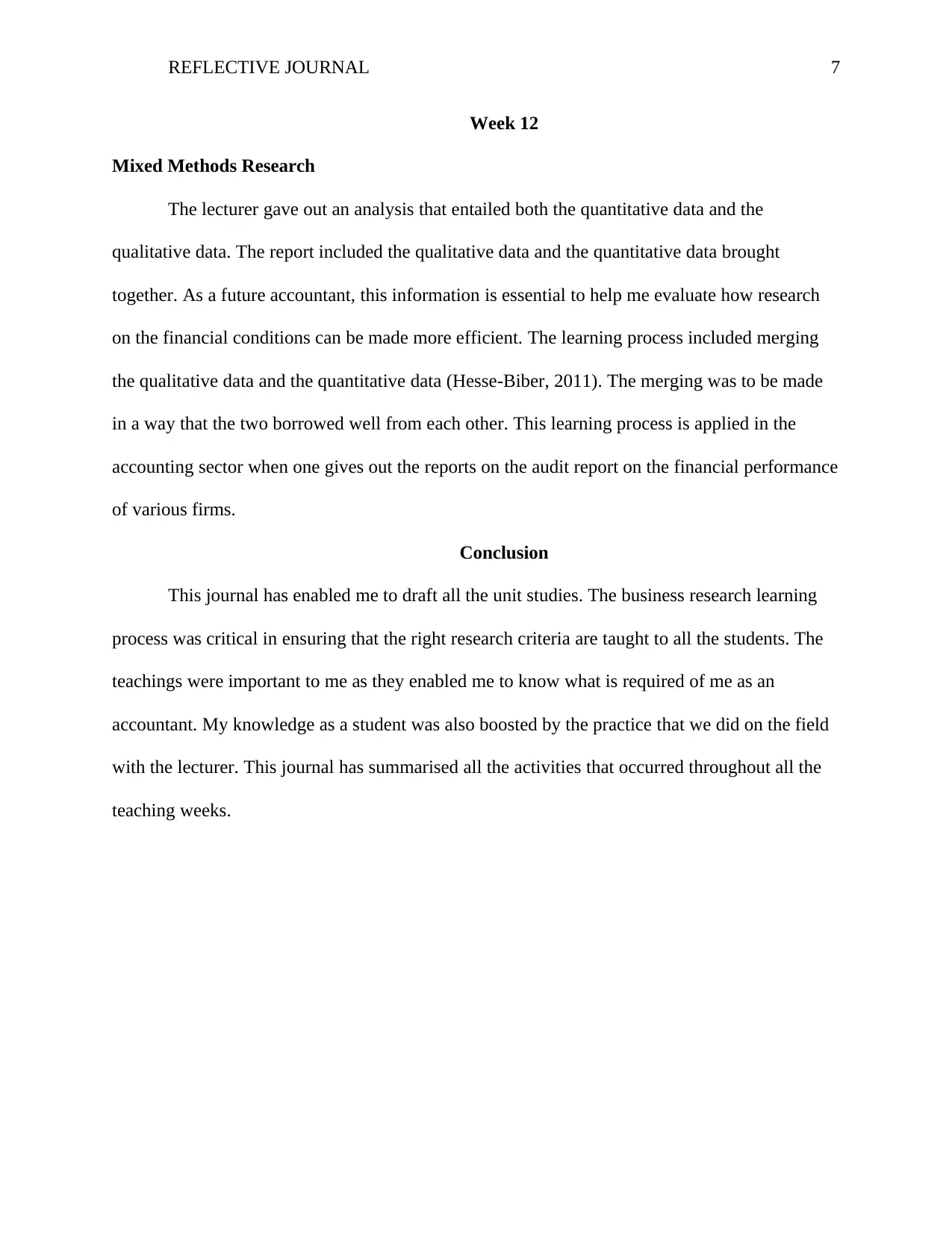
REFLECTIVE JOURNAL 7
Week 12
Mixed Methods Research
The lecturer gave out an analysis that entailed both the quantitative data and the
qualitative data. The report included the qualitative data and the quantitative data brought
together. As a future accountant, this information is essential to help me evaluate how research
on the financial conditions can be made more efficient. The learning process included merging
the qualitative data and the quantitative data (Hesse-Biber, 2011). The merging was to be made
in a way that the two borrowed well from each other. This learning process is applied in the
accounting sector when one gives out the reports on the audit report on the financial performance
of various firms.
Conclusion
This journal has enabled me to draft all the unit studies. The business research learning
process was critical in ensuring that the right research criteria are taught to all the students. The
teachings were important to me as they enabled me to know what is required of me as an
accountant. My knowledge as a student was also boosted by the practice that we did on the field
with the lecturer. This journal has summarised all the activities that occurred throughout all the
teaching weeks.
Week 12
Mixed Methods Research
The lecturer gave out an analysis that entailed both the quantitative data and the
qualitative data. The report included the qualitative data and the quantitative data brought
together. As a future accountant, this information is essential to help me evaluate how research
on the financial conditions can be made more efficient. The learning process included merging
the qualitative data and the quantitative data (Hesse-Biber, 2011). The merging was to be made
in a way that the two borrowed well from each other. This learning process is applied in the
accounting sector when one gives out the reports on the audit report on the financial performance
of various firms.
Conclusion
This journal has enabled me to draft all the unit studies. The business research learning
process was critical in ensuring that the right research criteria are taught to all the students. The
teachings were important to me as they enabled me to know what is required of me as an
accountant. My knowledge as a student was also boosted by the practice that we did on the field
with the lecturer. This journal has summarised all the activities that occurred throughout all the
teaching weeks.
Paraphrase This Document
Need a fresh take? Get an instant paraphrase of this document with our AI Paraphraser
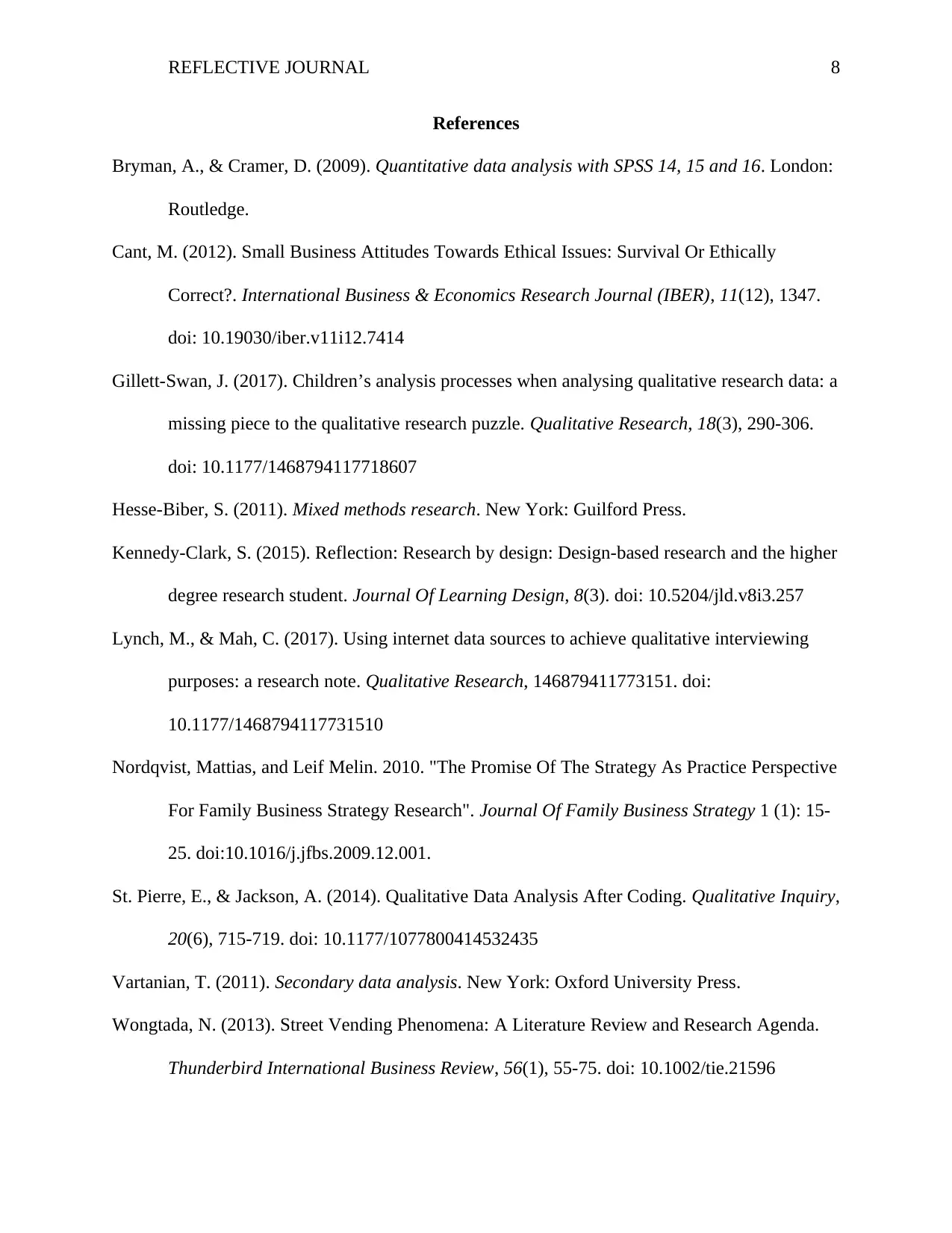
REFLECTIVE JOURNAL 8
References
Bryman, A., & Cramer, D. (2009). Quantitative data analysis with SPSS 14, 15 and 16. London:
Routledge.
Cant, M. (2012). Small Business Attitudes Towards Ethical Issues: Survival Or Ethically
Correct?. International Business & Economics Research Journal (IBER), 11(12), 1347.
doi: 10.19030/iber.v11i12.7414
Gillett-Swan, J. (2017). Children’s analysis processes when analysing qualitative research data: a
missing piece to the qualitative research puzzle. Qualitative Research, 18(3), 290-306.
doi: 10.1177/1468794117718607
Hesse-Biber, S. (2011). Mixed methods research. New York: Guilford Press.
Kennedy-Clark, S. (2015). Reflection: Research by design: Design-based research and the higher
degree research student. Journal Of Learning Design, 8(3). doi: 10.5204/jld.v8i3.257
Lynch, M., & Mah, C. (2017). Using internet data sources to achieve qualitative interviewing
purposes: a research note. Qualitative Research, 146879411773151. doi:
10.1177/1468794117731510
Nordqvist, Mattias, and Leif Melin. 2010. "The Promise Of The Strategy As Practice Perspective
For Family Business Strategy Research". Journal Of Family Business Strategy 1 (1): 15-
25. doi:10.1016/j.jfbs.2009.12.001.
St. Pierre, E., & Jackson, A. (2014). Qualitative Data Analysis After Coding. Qualitative Inquiry,
20(6), 715-719. doi: 10.1177/1077800414532435
Vartanian, T. (2011). Secondary data analysis. New York: Oxford University Press.
Wongtada, N. (2013). Street Vending Phenomena: A Literature Review and Research Agenda.
Thunderbird International Business Review, 56(1), 55-75. doi: 10.1002/tie.21596
References
Bryman, A., & Cramer, D. (2009). Quantitative data analysis with SPSS 14, 15 and 16. London:
Routledge.
Cant, M. (2012). Small Business Attitudes Towards Ethical Issues: Survival Or Ethically
Correct?. International Business & Economics Research Journal (IBER), 11(12), 1347.
doi: 10.19030/iber.v11i12.7414
Gillett-Swan, J. (2017). Children’s analysis processes when analysing qualitative research data: a
missing piece to the qualitative research puzzle. Qualitative Research, 18(3), 290-306.
doi: 10.1177/1468794117718607
Hesse-Biber, S. (2011). Mixed methods research. New York: Guilford Press.
Kennedy-Clark, S. (2015). Reflection: Research by design: Design-based research and the higher
degree research student. Journal Of Learning Design, 8(3). doi: 10.5204/jld.v8i3.257
Lynch, M., & Mah, C. (2017). Using internet data sources to achieve qualitative interviewing
purposes: a research note. Qualitative Research, 146879411773151. doi:
10.1177/1468794117731510
Nordqvist, Mattias, and Leif Melin. 2010. "The Promise Of The Strategy As Practice Perspective
For Family Business Strategy Research". Journal Of Family Business Strategy 1 (1): 15-
25. doi:10.1016/j.jfbs.2009.12.001.
St. Pierre, E., & Jackson, A. (2014). Qualitative Data Analysis After Coding. Qualitative Inquiry,
20(6), 715-719. doi: 10.1177/1077800414532435
Vartanian, T. (2011). Secondary data analysis. New York: Oxford University Press.
Wongtada, N. (2013). Street Vending Phenomena: A Literature Review and Research Agenda.
Thunderbird International Business Review, 56(1), 55-75. doi: 10.1002/tie.21596
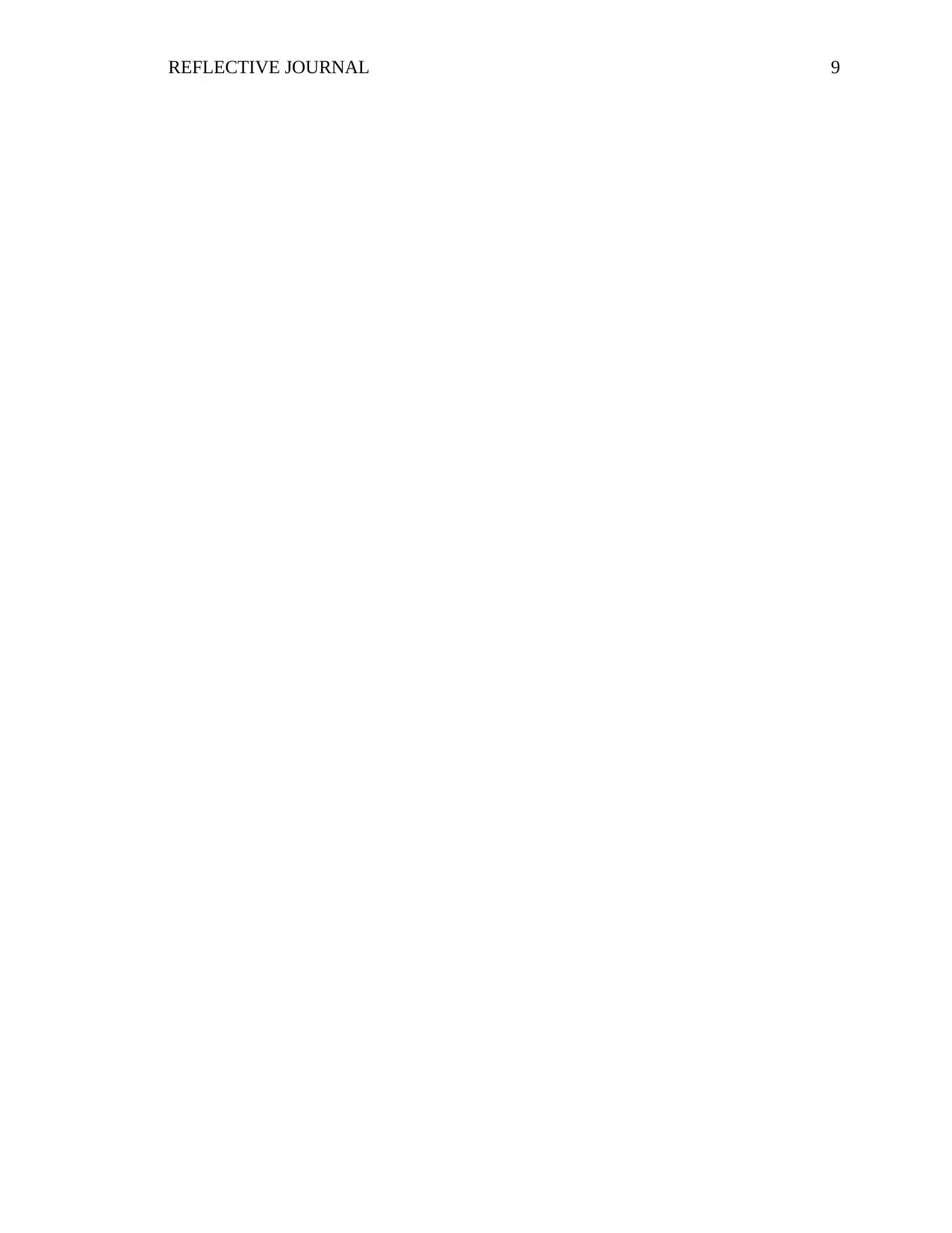
REFLECTIVE JOURNAL 9
⊘ This is a preview!⊘
Do you want full access?
Subscribe today to unlock all pages.

Trusted by 1+ million students worldwide
1 out of 9
Related Documents
Your All-in-One AI-Powered Toolkit for Academic Success.
+13062052269
info@desklib.com
Available 24*7 on WhatsApp / Email
![[object Object]](/_next/static/media/star-bottom.7253800d.svg)
Unlock your academic potential
Copyright © 2020–2026 A2Z Services. All Rights Reserved. Developed and managed by ZUCOL.





